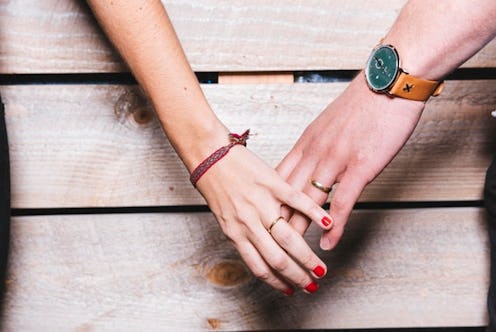
Although it can always be hard to leave an ex behind — and it's easy to carry your past baggage over to a new relationship — it can be especially difficult to establish a healthy relationship with a new partner if you were in an abusive relationship in the past.
"Oftentimes people who have been in abusive relationships lose their sense of self-worth," Melanie Shapiro, LICSW, who specializes in traumatic experiences, tells Bustle. "You can build your self-esteem by surrounding yourself with people who reinforce the idea that you deserve to be treated well."
The first step towards establishing a healthy relationship is remembering that you deserve a healthy relationship. But even if you know, logically, that this is the case, it can be difficult to truly believe it if you've had an abusive relationship. That's why it's so important to wait until you're truly ready before you start dating again.
So here's what else you need to know about getting into a healthy relationship after an abusive one, because help is out there.
Be Kind To Yourself
Remember that you're a person who deserves to be in a happy, healthy relationship, so engage in activities that make that feel true for you. "You can establish healthy connections by building your self-esteem and reminding yourself 'you deserve to be treated well'," Shapiro says. "Also, engaging in activities where you are caring for yourself, emotionally and physically, help build self-esteem and the ability to engage with others in healthy ways."
Take some time to focus on your health and sense of well-being — it will make it so much easier to establish a healthy relationship when the time comes. "Some examples of self-care activities are going for a walk, taking time alone to read a book, spending time with a friend, getting a manicure, taking a yoga class, going to the gym, or getting a massage," Shapiro says.
Consider Getting Help
If you're finding it really difficult to move on from your abusive relationship, that's OK and completely understandable. Seeking professional help might be the right option for you.
"Another way to build healthy relationships is to see a therapist/mental health professional," Shapiro says. "A therapist can help you become aware of your relationship patterns, allowing you to see what behaviors in others are red flags."
Your therapist can also show you what a healthy relationship looks like. "Also, a therapist can help you gain a sense of control and recognize the areas of your life you have a sense of agency," Shapiro says. "By having a corrective, healthy relationship with a therapist it can be a model for relationships outside the therapy room." Sometimes an objective, authoritative point of view can make all the difference.
Remember That Change Is Possible
Finally, when you've been through an abusive relationship you may feel hopeless or doomed, like this is the only way things can be from now on. But remember that this isn't the case. People move on from abusive relationships into happy and healthy ones all the time. "It is important to know new, healthy relationships are possible, change is possible!" Shapiro says. "Our brains and bodies want to heal and grow. Our brains have the capacity to build new neural pathways allowing us to have new experiences and lead healthier, happier, lives." Your brain can literally evolve along with your new point of view, so stay open to the possibility of change.
When you've been in an abusive relationship, it's totally natural to need time to come to terms with what happened, and it's important not to rush that. Don't feel pressure to move on too quickly. Instead, surround yourself with things that nourish you and remind you that you deserve to feel happy and healthy. And then, only when you're ready, think about dating again — with your mind set on a happy, healthy relationship.
Editor's Note: If you or someone you know is experiencing domestic abuse, call 911 or the National Domestic Violence Hotline at 1(800) 799-SAFE (7233) or visit thehotline.org.